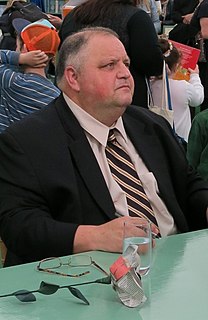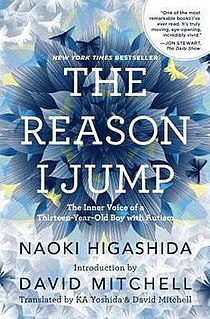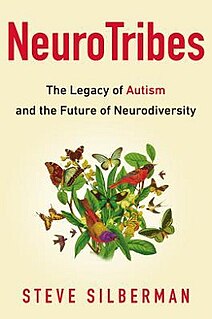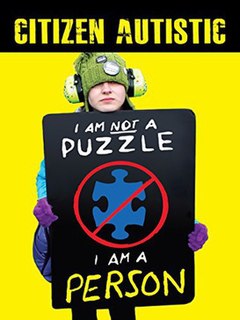Neurotypical is a neologism widely used in the neurodiversity movement as a label for non-neurodivergent people. That is, anyone who has a typical neurotype, so excluding autistic people, or those with ADHD, dyslexia, and so on. The term has been adopted by both the neurodiversity movement and the scientific community. It is not to be confused with the term allistic, which refers specifically to non-autistic people, who may or may not have a divergent neurotype.
Diagnoses of autism have become more frequent since the 1980s, which has led to various controversies about both the cause of autism and the nature of the diagnoses themselves. Whether autism has mainly a genetic or developmental cause, and the degree of coincidence between autism and intellectual disability, are all matters of current scientific controversy as well as inquiry. There is also more sociopolitical debate as to whether autism should be considered a disability on its own.

Neurodiversity, or ND, refers to variations in the human brain and cognition, for instance in sociability, learning, attention, mood and other mental functions. It was coined in 1998 by sociologist Judy Singer, who helped popularize the concept along with journalist Harvey Blume, and situates human cognitive variation in the context of biodiversity and the politics of minority groups. This view arose out of the autism rights movement, as a challenge to prevailing views that certain things currently classified as neurodevelopmental disorders are inherently pathological. It builds on the social model of disability, in which disability arises out of societal barriers interacting with individual differences, rather than people being disabled simply as a result of having impairments. Some neurodiversity advocates and researchers, notably Judy Singer and Patrick Dwyer, argue that the neurodiversity paradigm is the middle ground between strong medical model and strong social model. The subsequent neurodiversity paradigm has been controversial among disability advocates, with opponents arguing it risks downplaying the suffering associated with some disabilities, and calls for the acceptance of things some would wish to see treated. Autistic self-advocate and researcher Ari Ne'eman, one of the major advocates in the neurodiversity movement, suggested a trait-based approach, meaning that elements of the medical model can be applied in treating certain traits, behaviors, or conditions that are intrinsically harmful, whereas neurodiversity approaches can be applied to non-harmful or adaptive autistic traits of the same individual. Furthermore, in recent years, there have been developments of neurodiversity-affirming interventions and reforms of some interventions.

The autism rights movement, also known as the autistic acceptance movement, is a social movement within the context of disability rights that emphasizes a neurodiversity paradigm, viewing the autism spectrum as a result of natural variations in the human brain rather than as a disease to be cured. The movement advocates for several goals, including greater acceptance of autistic traits and behaviors; services that focus on improving quality of life and well-being rather than on suppression and masking of autistic traits, or imitations of the behaviors of neurotypical (non-autistic) peers ; and the recognition of the autistic community as a minority group.
Jim Sinclair is an autism-rights movement activist who, with fellow autistics Kathy Lissner Grant and Donna Williams, formed Autism Network International (ANI) in 1992. Sinclair became the original coordinator of ANI.

Autistic Pride Day is a pride celebration for autistic people held on 18 June each year. Autistic pride recognises the importance of pride for autistic people and its role in bringing about positive changes in the broader society.

Manuel F. Casanova is the SmartState Endowed Chair in Childhood Neurotherapeutics and a professor of Biomedical Sciences at the University of South Carolina School of Medicine Greenville. He is a former Gottfried and Gisela Kolb Endowed Chair in Outpatient Psychiatry and a Professor of Anatomical Sciences and Neurobiology at the University of Louisville.

Societal and cultural aspects of autism or sociology of autism come into play with recognition of autism, approaches to its support services and therapies, and how autism affects the definition of personhood. The autistic community is divided primarily into two camps; the neurodiversity movement and the Pathology paradigm. The pathology paradigm advocates for supporting research into therapies, treatments, and/or a cure to help minimize or remove autistic traits, seeing treatment as vital to help individuals with autism, while the neurodiversity movement believes autism should be seen as a different way of being and advocates against treatments, therapies or a cure, seeing it as trying to exterminate autistic people and their individuality. Both are controversial in autism communities and advocacy which has led to significant infighting between these two camps. While the dominant paradigm is the pathology paradigm and is followed largely by autism research and scientific communities, the neurodiversity movement is highly popular within autism advocacy and autism rights organizations.

The Autistic Self Advocacy Network (ASAN) is an American 501(c)(3) nonprofit advocacy organization run by and for individuals on the autism spectrum. ASAN advocates for the inclusion of autistic people in decisions that affect them, including: legislation, depiction in the media, and disability services.

Alexander Plank is an American autism advocate, filmmaker, actor, and the creator of Wrong Planet. He is known for founding the online community Wrong Planet, working on FX's television series The Bridge, and acting on The Good Doctor. At the age of 9, Plank was diagnosed with Asperger syndrome. Plank started Wrong Planet at the age of 17 in order to find others like him on the Internet. After the popularity of Wrong Planet grew, Plank has been frequently mentioned in the mainstream media in articles relating to autism, Asperger's, and autism rights.

Steve Silberman is an American writer for Wired magazine and has been an editor and contributor there for 14 years. In 2010, Silberman was awarded the AAAS "Kavli Science Journalism Award for Magazine Writing." His featured article "The Placebo Problem" discussed the impact of placebos on the pharmaceutical industry.

The Reason I Jump: One Boy's Voice from the Silence of Autism is a biography attributed to Naoki Higashida, a nonverbal autistic person from Japan. It was first published in Japan in 2007. The English translation, by Keiko Yoshida and her husband, English author David Mitchell, was published in 2013.
Diagnosis, treatment, and experiences of autism varies globally. Although the diagnosis of autism is rising in post-industrial nations, diagnosis rates are much lower in developing nations.

Jonathan Mitchell is an American author and autistic blogger who writes about autism including the neuroscience of the disorder and neurodiversity movement. His novel The Mu Rhythm Bluff is about a 49-year-old autistic man who undergoes transcranial magnetic stimulation.

Vaxxed: From Cover-Up to Catastrophe is a 2016 American pseudoscience propaganda film alleging a cover-up by the Centers for Disease Control and Prevention (CDC) of a purported link between the MMR vaccine and autism. According to Variety, the film "purports to investigate the claims of a senior scientist at the U.S. Centers for Disease Control and Prevention who revealed that the CDC had allegedly manipulated and destroyed data on an important study about autism and the MMR vaccine"; critics derided Vaxxed as an anti-vaccine propaganda film.

Julia Bascom is an American autism rights activist. She is the current Executive Director of the Autistic Self Advocacy Network (ASAN) and replaced Ari Ne'eman as president of ASAN in early 2017.

NeuroTribes: The Legacy of Autism and the Future of Neurodiversity is a book by Steve Silberman that discusses autism and neurodiversity from historic, scientific, and advocacy-based perspectives. Neurotribes was awarded the Samuel Johnson Prize in 2015, and has received wide acclaim from both the scientific and the popular press. It was named to a number of "best books of 2015" lists, including The New York Times Book Review and The Guardian.
Deej is a 2017 documentary about David James (DJ) Savarese, a nonspeaking autistic teenager with disabilities who is depicted as communicating through the scientifically discredited facilitated communication technique. The film's unskeptical depiction of facilitated communication, including the claims that DJ's degree from Oberlin College is legitimate, and that he is the author of the film's script, have been the subject of criticism.

Citizen Autistic is a 2013 documentary film directed by William Davenport exploring the advocacy work of autism rights activists. Citizen Autistic features interviews with autistic activists including Ari Ne'eman, co-founder and former president of the Autistic Self Advocacy Network, and Zoe Gross, creator of the Disability Day of Mourning annual vigils held in honor of filicide victims with disabilities. The documentary covers topics important to neurodiversity such as the debate over whether researchers should seek a cure for autism and controversies surrounding the nonprofit organization Autism Speaks and the Judge Rotenberg Center, a residential institution known for using electric skin shock aversive treatment as a form of behavioral modification.
Morénike Giwa Onaiwu is an American educator, author, and autism and HIV advocate. Alongside E. Ashkenazy and Lydia Brown, Onaiwu is an editor of All the Weight of Our Dreams, an anthology of art and writing entirely by autistic people of color published by the Autism Women's Network in June 2017.















